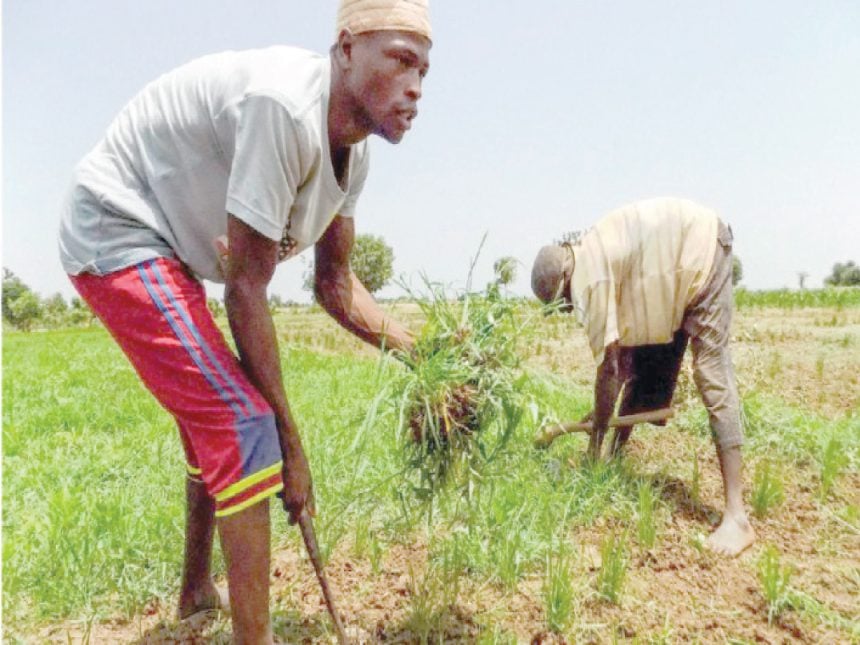Food security has long been talked about in Nigeria. However, the challenges to attaining this goal despite several efforts by government, particularly insecurity, seem to be unending. PAUL OMOROGBE revisits this issue as stakeholders point out solutions to this long-standing quagmire.
Recently, news about the Federal Ministry of Agriculture and Food Security went viral. The subject was an official memo reportedly calling for fasting and prayer to solve the challenge of national food security.
Reports said that the leaked internal circular dated June 11, issued by the Director of Human Resource Management, Mrs Adedayo Modupe, all senior and junior staff members, including directors, deputy directors, assistant directors, value chain desk officers, and other personnel, were asked to participate in the programme.
“This is to invite all staff of the federal ministry of agriculture and food security to a solemn prayer session for God’s guidance and success in supporting the government’s efforts to achieve food security,” the circular read.
Further details of the planned spiritual exercise, themed “Divine Intervention for Protection and National Development,” indicated that it was to foster a holistic approach to addressing food security challenges through a synergy of human effort and divine providence.
The sessions were planned to hold by 12:00 pm for three Mondays, on June 16th, 23rd and 30th, on which days staff were asked to “come fasting.” The scheduled venue was the conference hall of the ministry’s headquarters located in Abuja.
Shortly after the viral news, the ministry issued a statement to correct the impression that the communication was not “an official policy by the ministry to address agriculture and food security issues in the country.”
Signed by Ezeaja Ikemefuna, the Assistant Information Officer for the Director of Information, the statement read: “The ministry’s attention is drawn to the internal circular of the Human Resource Management Department being circulated by online media. In this regard, the ministry wishes to inform (the public) that the prayer session is an initiative of the human resource department to address the wellbeing of the staff just as the already existing monthly aerobic exercise and establishment of the gymnasium in the ministry are for physical fitness as the regular medical check-up of staff is for their health.
“The prayer was to address the apprehensiveness of staff over the recent untimely and successive death of management staff of the ministry. The staff also deem it not out of place to pray for the country, hence the theme of the prayer sessions is divine intervention for protection and national development.”
Needless to say that this episode sparked reactions from stakeholders and members of the general public on how long the challenge of national security will last and how it should be solved.
Food security in Nigeria
The World Food Programme (WFP) notes that with over 220 million people, Nigeria is the most populated country in Africa and the sixth in the world. It is the tenth-largest producer of crude oil in the world and achieved lower-middle-income status in 2014. However, around 84 million Nigerians, representing about 37 per cent of the total population, live below the poverty line.
The organisation was quick to point out that insecurity, among other issues is a major obstacle preventing food security in Nigeria. In its latest country brief, WFP noted: “Conflict and insecurity, rising inflation and the impact of the climate crisis continue to drive hunger in Nigeria. Conflict in the North East region has displaced 2.2 million people and left another 4.4 million food insecure in Borno, Adamawa and Yobe states. Three million of them are in Borno State, the epicentre of insurgency. Nigeria is subject to periodic droughts and floods.
This has had an adverse impact on agricultural output and increased the vulnerability of populations, especially in rural areas.
“Insurgent activities have added pressure to a fragile resource environment, deepened insecurity, hampered development, and heightened the food and nutrition insecurity of vulnerable women and children.”
In a joint statement, WFP, alongside the Food and Agriculture Organisation (FAO) and the United Nations Children’s Fund (UNICEF), stated that Nigeria, due to record inflation, climate factors and conflicts is projected to have 33 million food insecure people in 2025.
The figure represents a sharp increase from the 25 million who needed assistance in 2024, the bodies added.
“Never before have there been so many people in Nigeria without food,” Chi Lael, WFP Spokesperson for Nigeria, told journalists in Geneva at the UN.
Environmental factors, which often have human elements, have also been highlighted as a hindrance to food security in Nigeria.
As of September 2024, FAO had recorded 1.3 million hectares (ha) of land submerged, including 558 000 ha of cropland across the country. Floodwaters are expected to continue rising further as rivers swell and dams approach their maximum capacity, further threatening communities across Northern Nigeria. The National Emergency Management Agency (NEMA) has warned that the northeast and west are at imminent risk of further flooding. States most at risk include Borno, Bauchi, Bayelsa, Enugu, Jigawa, Kano, Kebbi, Kogi, Niger, Sokoto, Yobe, and Zamfara.
“The floods continue to push vulnerable communities deeper into poverty, and the widespread loss of farmland will severely affect food security. Urgent coordinated action is needed to avert a worsening humanitarian disaster,” said an FAO Representative, Koffy Dominique Kouacou.
Again, the FAO noted that Nigeria grapples with economic hardship, coupled with record high inflation (which reached 40.9 percent for food, and 34.2 percent for all items in June 2024). This is a record increase in food prices amid record high transportation costs.
According to the National Bureau of Statistics (NBS), the price of beans in October 2024 was 282 percent above the same period in 2023. Similarly, the price of local rice rise by 153 percent compared to October last year. These economic shocks resulted from the continuous devaluation of the Naira against the United States Dollar, external economic factors, and the removal of fuel subsidy.
`YOU SHOULD NOT MISS THESE HEADLINES FROM NIGERIAN TRIBUNE
What has the government promised?
Despite declaring a state of emergency at least twice (2023 and 2025) in food production, there is much to be desired from the President Bola Tinubu administration in the agriculture sector.
In 2024, speaking during the public presentation of Chief Olusegun Osoba’s book “My Life in the Public Eye” in Lagos, President Bola Tinubu, who was represented by Vice President Kashim Shettima, said the government was taking measures aimed at tackling food shortage and improving affordability.
“We are taking steps to address food shortages by temporarily removing tariffs on imported grains and other food items,” President Tinubu stated.
He stressed that this action is part of a comprehensive strategy to enhance living conditions for all Nigerians.
While addressing short-term challenges, the president also reiterated the importance of long-term food self-sufficiency.
“We will continue to drive local production and ensure that we produce what we eat and use locally,” he added.
In May, this year, the vice-president during a visit to Jalingo, Taraba State, said: “Food sufficiency is the first currency of national stability. This is why we have prioritised agriculture as the anchor of our national strategy.”
Indeed, numerous initiatives have been embarked on through the Ministry of Agriculture and Food Security led by Senator Abubakar Kyari, and supported by Minister of State, Senator Sabi Abdullahi.
However, some of these initiatives have faced criticism by experts and stakeholders. For example, following the announcement by Kyari in July 2024, the Federal Government would suspend duties, tariffs, and taxes on the importation of maize, husked brown rice, wheat, and cowpeas through the country’s land and sea borders, for 150 days.
Former Minister of Agriculture and outgone President of African Development Bank, Akinwumi Adesina, said: “Nigeria’s recently announced policy to open its borders for massive food imports, just to tackle short-term food price hikes, is depressing.”
He warned that the policy could undermine all the hard work and private investments that have gone into Nigeria’s agriculture sector.
“Nigeria cannot rely on the importation of food to stabilize prices. Nigeria should be producing more food to stabilize food prices, while creating jobs and reducing foreign exchange spending, that will further help stabilise the Naira.
“Nigeria cannot import its way out of food insecurity,” he said.
What to do
“The major problem we are facing in Nigeria today is that we are simply not producing enough,” Alhaji Salihu Imam, a farmer, told Nigerian Tribune.
“And I’ve proposed some solutions. In agriculture, please make funds cheaply and easily available to farmers. I’m not talking of dollars. I’ve always been against getting freebies. All this so-called palliatives are not my suggestion.
“Let the Central Bank of Nigeria (CBN) do its real duty to not only Nigeria, not only to farmers or agriculture, all in the real sector. Let them ensure that these banks make funds easily available at the best or cheap enough interest. For example, if we have loans for agriculture at maximum of 5 percent, Nigeria will turn for the better. What really was working for Nigeria before? It’s because we were all producing, we were all active,” he said.
He added that security was another major issue. “We’ve seen some improvement, but it’s as if we are going back to the old days of insecurity.
“I quite appreciate what the security people are doing because it’s not easy to secure a big country like Nigeria. But we should deplore modern gadgets to fight crime.
“Even we farmers have drones to do some of our farming. I’m talking of us, small farmers, not those with thousands of acres or hectares of farmland.
“Nigeria is sophisticated enough. Our president is enlightened. All the security people are enlightened. So please, we should use, deplore this modern equipment to fight crime,” he said.
Professor of Economics, former Economics Head of Department at Covenant University, Professor Evans Osabuohien, in an interview with Nigerian Tribune said that Nigeria, and indeed the whole of Africa, has definite potentials to feed itself due to the abundance of fertile and arable land and favorable climate. He said the country had the potentials for successful animal husbandry also. However, he noted that Nigeria has been unable to take advantage of its privileges. The professor pointed out that from research the challenge was not so much on food production.
“What we have is the challenge of post-harvest losses. When you go to the rural communities, you see mangoes, oranges being wasted. Even cassava gets wasted before it is transported to the cities or urban areas where they are needed.”
Professor Osabuohien noted that the solution is to see: “how we can process the harvested food, and leverage on the value chain after harvest”. He said processing, packaging and branding were necessary. “This is where we need to ensure that we minimise post-harvest losses.”






